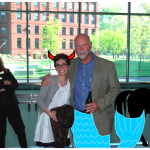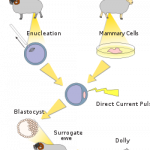Bioethics
The reaction to the Venter Institute's synthetic genome transplantation has been decidedly mixed. Is this the beginning of something new and wonderful, the ability to really design organisms from scratch? Is it something more sinister, the beginning of a dark era where techno-corporate (or terrorist) interests can design something that will destroy the environment in catastrophic ways? Is it just a technical advance or a conceptual breakthrough? A philosophical revolution? Is it a Big Deal or big whoop? Synthetic biology has never been just one thing and still has many different goals, with a…
Things have been a bit quiet here as I finished up my crazy
four-month-long book tour, and there's much to catch up on. First, some big news just in: Oprah,
Alan Ball, and HBO are going to be making a movie version of my book, The Immortal Life of Henrietta Lacks. This news has gotten quite a bit of
coverage on Twitter and elsewhere, with me fielding questions about the movie,
and various folks voting on who should play which character in the film (not
that I have any control over such things, but it's still fun to think about).
The combination of Oprah, Alan Ball, and HBO…
Things have been a bit quiet here as I finished up my crazy
four-month-long book tour, and there's much to catch up on. First, some big news just in: Oprah,
Alan Ball, and HBO are going to be making a movie version of my book, The Immortal Life of Henrietta Lacks. This news has gotten quite a bit of
coverage on Twitter and elsewhere, with me fielding questions about the movie,
and various folks voting on who should play which character in the film (not
that I have any control over such things, but it's still fun to think about).
The combination of Oprah, Alan Ball, and HBO…
Unlike many of my colleagues, I'm not really interested in the whole "science vs. religion" thing, but I do want to point out the very thoughtful analysis of genetic engineering and synthetic biology by the Church of Scotland's Society, Religion, and Technology Project. On GM food, they write:
The official scientific and economic reports support the view of the 1999 Assembly, that GM is not a simple 'yes or no' issue and must be taken case-by-case, weighing up many different factors. Theologically, SRT has found no convincing reason to say it is a wrong act to transfer genes into a crop from…
My semester in MIT's course on Documenting Science Through Video and New Media has drawn to a close. I've had a wonderful time and learned a lot about how films and science are constructed by different people in different times for different reasons. Most of all I've learned about how challenging it can be to put together an interesting narrative and present a point of view while at the same time ensuring that the science being explained is honest and clear to everyone. I've recently gotten the chance to watch two great recent science documentaries outside of class, Naturally Obsessed and…
New in vitro fertilization technology is making it possible for someone to have two moms--one that provides the genome in the nucleus of the cell, and one that provides the rest of the egg cell, including the mitochondria. Since all mitochondria are passed down from the mother in the egg (sperm are just too small to provide anything but the father's genetic material to the fertilized embryo), transplanting the nucleus from a fertilized embryo to an egg from a different woman can bypass the transmission of any mitochondrial diseases that the mother carries. Because mitochondria have their own…
I got a lot of interesting responses to my post about DIYbio and how modeling innovation in biotech on computer hacker culture may lead to a science that is less "democratized" than what is being proposed. My friend Adam pointed me to Jaron Lanier's work criticizing the "open" and "free" culture movements online as both unfair and leading to cultural stagnation. While I don't agree with all of Lanier's arguments about the prospects of an open digital culture, he makes a lot of really important points that resonate with my feelings about the future of science based on the open online model, in…
Today at the University of California at Los Angeles, a rally is planned to raise awareness about the value of responsible animal research and to denounce acts of terrorism toward animal researchers and their families. The highlight of the Pro-Test rally will be the presentation to legislators and the media a petition with nearly 12,000 signatures of scientists who support the use of animals in research.
The rally and the petition drive is a joint effort of Americans for Medical Progress, Pro-Test for Science, and Speaking of Research.
I stand together with my colleagues who conduct animal…
Last week's issue of Nature focused on the progress (or lack thereof) in genomics and related fields since the Human Genome Project (HGP) was completed ten years ago. In many ways, the era of genomics has yet to fulfill many of the promises made twenty years ago, but the investment in science and technology has at the same time made a valuable impact on many fields in basic science. Understanding this recent history of the genomics bubble is crucial to how we approach current science and technology investments in areas such as personal genomics and importantly, synthetic biology.
In a…
I'm posting answers to FAQs about my book, The Immortal Life of Henrietta Lacks, as an ongoing series on this blog. In my last FAQ post, I told the story of how I first learned about HeLa cells at sixteen. A related question I often get has to do with this one sentence in the book's prologue:
"I was a kid who'd failed freshman year at the regular public high
school because she never showed up. I'd transferred to an alternative
school that offered dream studies instead of biology, so I was taking
Defler's class for high-school credit, which meant that I was sitting
in a college…
About four months ago, the skeptical blogosphere was abuzz about a tragic story. The story was that of a Belgian man named Rom Houben, who had been unfortunate enough to have been in a motor vehicle collision and suffered serious brain injury. That brain injury left him in a comatose state, which had been diagnosed as a persistent vegetative state. What brought him worldwide prominence was a claim by neurologist Steven Laureys that he was not in a persistent vegetative state at all, but was rather fully conscious and "locked in," meaning that he could see, hear, and feel everything but could…
I mentioned a while ago that I'll be posting answers to FAQs about my book, The Immortal Life of Henrietta Lacks, as an ongoing series on this blog.
I thought I'd start the FAQs with one of the most commonly asked questions: How did you learn about Henrietta and the HeLa cells, and why did they grab you the way they did? Here is the answer, which I also posted about over on Powells.com's book blog this last week as part of a little guest blogging stint:
I first learned about Henrietta Lacks in the late 80s, when I was 16 and sitting in a basic biology class at Portland Community College
(…
I mentioned a while ago that I'll be posting answers to FAQs about my book, The Immortal Life of Henrietta Lacks, as an ongoing series on this blog.
I thought I'd start the FAQs with one of the most commonly asked questions: How did you learn about Henrietta and the HeLa cells, and why did they grab you the way they did? Here is the answer, which I also posted about over on Powells.com's book blog this last week as part of a little guest blogging stint:
I first learned about Henrietta Lacks in the late 80s, when I was 16 and sitting in a basic biology class at Portland Community College
(…
Last month, in response to some truly despicable activities by animal rights zealots, I wrote a series of posts about how animal rights activists target even researchers' children and appear to fetishize violence. This simply continued a string of posts that I've done over the years, the longest (and, in my not-so-humble-opinion, the best) deconstructs a lot of the bad scientific arguments used by animal rights activists to claim that animal research is useless, or nearly so, as well as other arguments made by extremists. One of the key points emphasized in these responses is that, regardless…
People often ask whether the Lacks family has joined me for any of my book tour events, and how they feel about the book. Here, in the first of what will be several trailers of The Immortal Book Tour, you can see bits of the tour, including the blizzard that nearly prevented me from getting there, many great photos, footage of several Lacks family members talking about The Immortal Life of Henrietta Lacks, and more (video by Mr. Culture Dish, David Prete):
The fight over genetically modified foods, whether they're safe, healthy, good for the environment, or just plain "unnatural," has been going on for a long time now. Most people in the scientific community agree that genetic modification in general is a good thing, able to create crops that need less water, less fertilizer, less pesticide, or that contain extra vitamins and nutrients that are otherwise difficult to come by in certain parts of the world. Many would also argue that fighting against such life-saving, often environmentally sustainable modifications is a sign of an ignorant anti-…
I hadn't really planned on writing anymore about animal rights extremists. The topic seemed as though it had played out over the few days. But those who've followed this blog know that I'm nothing if not tenacious when I grab onto a topic, and sometimes certain topics demand several posts. More importantly, over the last few days, I've had a minor infestation of animal rights extremists into my blog. Heck, Camille Marino even made an appearance. However, one animal rights apologist has been particularly persistent, someone named Douglas Watts, who's been a particularly persistent pest,…
I spent a lot of time writing about animal rights extremists who have threatened to harass the children of an investigator whom they view as a "vivisector" and how they fetishize the very violence they decry. Unfortunately, I was disappointed to see that a fellow ScienceBlogger, namely Eric Michael Johnson of The Primate Diaries, appears to share some of the scientific misconceptions that the animal rights extremists when he prefaces an Open Letter to the Animal Liberation Front with:
Vivisection, or what in polite society is merely called animal experimentation, is a barbaric practice that…
As much as I hate to bring more attention than I did a couple of days ago to the truly evil animal rights extremist website run by a truly despicable animal rights terrorist wannabe Camille Marino, a website whose very title, Negotiation Is Over (NIO) tells you everything you need to know about the attitude of the loons running the site, especially given their targeting of researchers' children for harassment, I can't help but notice that the efforts of fellow science bloggers and myself have been noticed, both at NIO and another animal rights site Thomas Paine Corner.
Good.
The reaction of…
I have to admit, this one made me chuckle.
In an earlier post today, in which I expressed my outrage at animal rights terrorists targeting an investigator's children for harassment at their school, I asked the following question:
That reminds me: Where were these animal rights loons when "Andrew Wakefield was torturing baby Macacque monkeys in the name of horrendously bad science designed to be used as a "made for court" study against vaccine manufacturers?
Paul Browne responded in the comments:
Perhaps crank magnetism also acts as a force field that protects cranks from other cranks.
I…




